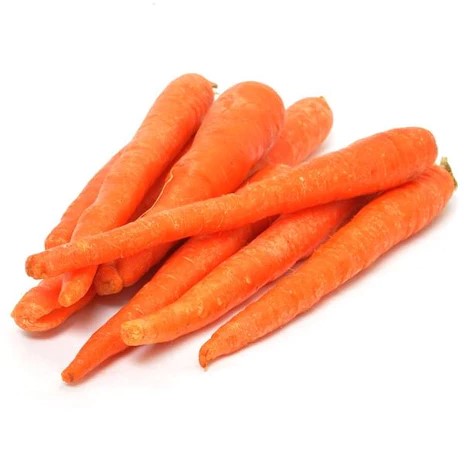Spice up your Springtime

This time of year may find you looking for something new to make for dinner. You know, Spring is just around the corner so perhaps you would like something to spice up a routine workday meal. Try this Carrot Chile and Cilantro Soup from www.allrecipes.com. It takes very little time to prep (15 min.) and only about 45 minutes to cook.
Carrot Chile and Cilantro Soup
1 tablespoon olive oil
1 teaspoon crushed Melissa's Organic Garlic
1 tablespoon chopped Melissa’s Fresh Organic Cilantro
1 teaspoon chile paste
1 Melissa’s Organic Yellow Onion, chopped
3 large Melissa’s Organic Carrots, peeled and sliced
1 large Melissa’s Organic Russet Potato, peeled and chopped
5 cups vegetable broth
Heat oil in a large pot over medium heat. Heat garlic, cilantro and chile paste in the pot. Add onion and sauté until tender. Stir in carrots and potato; cook 5 minutes and then pour in vegetable broth. Simmer for 30 to 45 minutes, or until potatoes and carrots are soft. With a hand blender, blend until smooth. Serves 4 to 6.
Speaking of carrots, the other day a customer said to me, "I’ve been eating carrots all my life and I’ve heard that eating carrots is good for your vision. Are they good for anything else?" And amazingly I had just read about a study that said if you have been eating carrots for at least 15 years you may find that your memory is a bit better than someone who hasn’t. Apparently a recent study of healthy men found that men who took 50mg a day worth of beta carotene (4 carrots a day) for 15 years or more scored consistently higher on standard memory tests. This may be why folks who eat a lot of Melissa's carrots and produce always remember to come back for more.
If you are like most folks, you probably find yourself wondering what to do with the rest of the bunch of cilantro after you’ve made a recipe like the one above. Well wonder no more! Here is a great recipe that will use up the bunch and provide a good side dish for your soup.
Cilantro Slaw from the Sunset Low Fat Mexican Cookbook
5-6 cups shredded cabbage (I do ½ red and ½ green for color)
1 cup firmly packed Melissa’s Fresh Organic Cilantro, leaves, minced
1/4 cup organic lime juice
1 Tablespoon each water and honey
1/2 teaspoon cumin seeds
Salt and pepper to taste
In a large nonmetal bowl, mix all ingredients together.
If you don’t make the slaw with the soup, you will want to rinse the cilantro before you store it in the refrigerator. After rinsing, you can wrap it in a paper towel and store it moist (not wet) for up to a week. If this recipe does not make you want to eat cole slaw, then consider this. Have you ever heard of vitamin U? Cabbage has lots of this lesser known vitamin, which is an effective ulcer remedy. Higher in vitamin C than oranges, a good source of vitamin E, calcium and fiber, cabbage is also very rich in sulfur. Sulfur compounds in cabbage, as well as its relatives broccoli, kale and Brussels sprouts, are found to be powerful cancer fighters, especially against intestinal cancer. Alternative health practitioners also say the sulfur in cabbage purifies the blood and helps fend off parasites. Not bad for a vegetable that you walk by week after week in the produce department. Is it important to buy Melissa’s Organic Cabbage?
Here is some food for thought. It takes two to three months to grow a head of cabbage. That is about what it takes for tomatoes and peppers too, but more than what lettuce or beans need. Longer growing time means that extra nitrogen, the #1 nutrient for all plants, is needed. Organic farmers meet these needs by building the soil up so it can supply nitrogen at a slow and steady pace. They don’t use the highly soluble, synthetic fertilizers conventional farmers do. Why? Because synthetic fertilizers are like white sugar—they provide short-term energy, but do not feed the soil. Good soil health or fertility depends on the continuing activity of macro-organisms such as earthworms and micro-organisms such as bacteria, which "eat" organic matter containing nitrogen, phosphorus and potassium, and digest or convert it into compounds, which plants can use as nutrients.
Organic farmers feed the soil to feed the plant creating a living entity of billions of micro-organisms, over the long haul. And by taking care of the soil it will continue to produce nourishing food for many years to come. Enjoy the Spring, Mark.

